A Moʻolelo for ʻUmi: A Famous Aliʻi of These Hawaiian Islands.
* Simeon Keliikaapuni. "He Moolelo no Umi." Ka Nupepa Kuokoa. March 1, 1862. * Translation by Kealaulili, 2014.
1 Comment
A Moʻolelo for ʻUmi: A Famous Aliʻi of These Hawaiian Islands.
*Original text: Simeon Keliikaapuni. "He Moolelo no Umi," Ka Nupepa Kuokoa. Feb. 22, 1862. *Translation by Kealaulili. A Moʻolelo for ʻUmi: A Famous Aliʻi of These Hawaiian Islands.
No Nunu me Kakohe Regarding Nunu and Kakohe
A Moʻolelo for ʻUmi: A Famous Aliʻi of These Hawaiian Islands.
No ko ʻUmi Noho ʻIlihune ʻana ma Laupāhoehoe |
Helu 2 (Hoʻomau ʻia)I ko lakou noho ana malaila [ma Waipunalei], kuka lakou e huna ia Umi, aole e hai i kona inoa; kuka hou lakou, aole e hana o Umi, e noho wale no, a noho wale o Umi e like me ko lakou manao. A i ko lakou liuliu ana malaila, hele aku o Piimaiwaa, a me Koi, me Omaokamau, e mahiai ma ke kihapai o ko lakou makuahonowai aka, o Umi ka i hele ole. I ko lakou hoi ana, mai ka mahiai mai, olioli ko lakou makuahonowai no ko lakou ikaika i ka mahiai. Aka, o ko Umi mau makuahonowai, kaumaha loa no ko Umi ikaika ole i ka mahiai no kana wahine. A i kekahi wa, hele lakou ma kahakai o Laupahoehoe, he akamai o Umi i ke kahanalu, a heihei ana, hooke ikaika mai o Paiea [he kanaka akamai i ka heenalu no Laupahoehoe] ia Umi [i ka pohaku], eha loa ko Umi poohiwi ia Paiea, oia ko Paiea hewa i make ai ia Umi, i ko Umi wa i ku ai i ka moku. A hiki i ke kau Aku o ua wahi la, holo o Piimaiwaa, Omaokamau, me Koi, i ka hoe Aku me kamaaina o ia wahi. I ka wa i loaa mai ai ka lakou Aku, olioli ko lakou mau makuahonowai; aka, o ko Umi mau makuahonowai, kaumaha loa no ko Umi holo ole i ke kaohi Aku me na lawaia o ia wahi. I mai na makuahonowai o Umi i kana mau wahine. "Ina paha ka puipui o ka olua kane, he kanaka lawai-a, ina ua aina ke Aku; aka, makehewa ko olua mau kino ia ia." I kekahi manawa, ike mai na lawai-a he kanaka puipui o Umi, i mai lakou ia ia e hele i ke kaohi Aku, ae aku no o Umi i ka lakou olelo, aole nae lakou i ike he alii o Umi; aka, ua kaulana loa ka nalo ana o Umi. Aole nae lakou i ike o Umi keia. I ko Umi holo ana e kaohi Aku i ka wai, haawiia mai ai kana Aku e ka lawai-a, ike aku o Umi, ua polalo mai ka lawai-a i ke Aku malalo o ka lemu, aole o Umi i lawe ia i-a nana. Aka, kuai aku o Umi i kana ia me ke kaohi e, ka mea i haawiia mai kona ia maluna mai, i mai o Umi, "Homai na'u kau i-a uuku, eia mai kau o ka i-a nui," ae mai kela kaohi. Aole o Umi i ai i ua i-a nei, lawe aku no na Kaili, (kona akua) aia no ma kahi o Hokuli, ko Umi wahi i huna ai. E ka mea heluhelu, e nana kakou i kekahi lala o keia kuamoo olelo no keia hana kapanaha a Umi. Wahi a Samuel M. Kamakau, "I ka ike ia ana o Umi he kanaka ikaika, a ua makemake nui ia o Umi i kanaka kaohi malau aku, a ua makaukau io no, a ua ikaika maoli no i ka hoe waa. I kekahi wa, ua nui ka ia, a ua haawi pono ia mai ka ia, a i ka wa uuku o ka ia, ua poho lalo ia malalo o ka noho'na ke pakahikahi aku, alaila, ua haumia kela ia malalo o ka noho'na, a ua hoopailua ke akua aole pono ke hoali aku na ke akua, a nolaila, ua kuai ia me ke kanaka i loaa pono ka ia maluna pono mai, aole ma ka noho'na, a ina hookahi wale no wahi ia, aole e ai o Umi, ua waiho no oia na kona akua na Kukailimoku, aia ma ke ala iho o Hokuli [he pali ia], a ua huna ia iloko o ke ana; a no ka ikaika o Umi i ke kaohi aku a me ka hoe waa, ua kapaia o Puipui-a-kalawaia." (Ke Au Okoa, Nov. 17, 1870.) I kona holo pinepine ana i ka lawai-a, haohao o Kaleioku [he kahuna oia] i ka pio mau o ke anuenue ma ia malau. Manao o Kaleioku, o Umi paha kela; no ka mea, ua loheia ko Umi nalowale ana. Alaila, iho mai o Kaleioku me ka puaa, a ike oia ia Umi e noho ana me ka hanohano, a manao iho la o Kaleioku, he alii keia. Alaila, kaumaha aku la oia i ka puaa, me ka i aku, "Eia ka puaa e ke akua, he puaa imi alii." I ka Kaleioku kuu ana'ku i ka puaa, holo aku la ka puaa a ku ma ko Umi alo; alaila, huli hou mai ua puaa nei ia Kaleioku. Ninau aku o Kaleioku, "O Umi anei oe?" Ae mai o Umi, "Ae, owau no." I aku o Kaleioku, "E hoi kaua i ko'u wahi." Ae mai no o Umi; alaila, i ae la kona mau makuahonowai, a me kolaila mau kanaka a pau. "He alii ka keia! o Umi ka ia!! o ka Liloa keiki ka!!! ka mea a kakou i lohe iho nei i keia mau la, ua nalowale." (Aole i pau) | Chapter 2 (Continued)As they settled in there [at Waipunalei], they discussed concealing 'Umi, and not speaking his name. They further discussed that 'Umi should not work, but just rest. And so 'Umi consented with their wishes. As they remained there for some time, Pi'imaiwa'a, Kōī, and ʻŌmaʻokāmau began to go and cultivate the fields of their wahine's parents, but ʻUmi did not go. When they returned from their farming, the parents of their wahine rejoiced in their strength as farmers. However, the parents of ʻUmi's wahine were deeply bothered by ʻUmi's lack of effort in farming for his wahine. At another time, they went to the ocean at Laupāhoehoe. ʻUmi was very skilled in body surfing, and in one particular contest urged on by Paiea [a skilled surfer of Laupahoehoe], ʻUmi was crowded [into the rocks] by Paiea, and ʻUmi's shoulders were struck and injured. That wrongdoing of Paiea is what brought death to him by ʻUmi, when ʻUmi later ruled the island. When the aku season arrived at that place, Piʻimaiwaʻa, ʻŌmaʻokāmau, and Kōī went out aku fishing with the kamaʻāina of that place. When the time came that they caught their aku, the parents of their wahine again rejoiced. But the parents of ʻUmi's wahine were troubled by ʻUmi's refraining to go catch aku with the fishermen of that place. These parents of ʻUmi's wahine said to their daughters, "If your strong, able-bodied kāne was perhaps a fisherman, then the aku would be yours to eat, but your bodies are being wasted upon him." At another time, the fishermen saw that ʻUmi was a sturdy man, so they told him to come aku fishing with them. ʻUmi agreed to their request, but they did not see that he was an aliʻi. Though it was well known that ʻUmi was in hiding, they did not know that this indeed was ʻUmi. When ʻUmi went out to catch aku in the water, he was given a fish by the other fishermen, but ʻUmi saw that the fisherman had reached between his legs and grabbed the aku from under his buttocks. So ʻUmi did not take that fish for him. Instead, ʻUmi traded his fish with the one who had withheld the fish taken from above for himself. ʻUmi said to him, "Give to me your small fish. Here is yours, a big fish," and that withholder agree. ʻUmi, however, did not eat that fish. It was taken and offered to Kāʻili (his akua), at a place called Hokuli, where ʻUmi had hidden it. Oh reader, let us now look at another branch of this path of tradition about these wonderful deeds of ʻUmi. According to Samuel M. Kamakau, "When it was seen that ʻUmi was a strong man, many desired that he join them in aku fishing, for he was indeed skilled and truly strong as a canoe paddler. At times, when the fish were abundant, the fish was given out in a pono way. However, in times when the fish were scarce, they were dealt dishonestly from beneath the seat when apportioned out. Those fish from below the seat were then haumia (defiled), and the akua would become offended by it if it were offered to the akua. Therefore, an exchange would be made with someone who received fish in a pono way, from above rather than below the seat. And if there was only one fish, ʻUmi would not eat it. He would leave it for his akua, Kūkāʻilimoku, which was hidden inside of a cave along the trail descending Hokuli [a cliff]. Thus, because of his skill and strength in aku fishing and canoe paddling, ʻUmi was called "Puʻipuʻi-a-ka-lawaiʻa" (Stalwart fisherman). As he began regularly going out fishing, Kaleiokū [a kahuna] marveled at the frequent appearance of the arching rainbow above those calm aku fishing grounds. Kaleiokū thought, perhaps that was ʻUmi, because ʻUmi's disappearance had been heard of. Therefore, Kaleiokū descended with a pig, and he saw ʻUmi sitting there in a dignified manner. Kaleiokū then thought to himself, this is a chief. He then lifted the pig and spoke thus, "Here is the pig, oh akua, a chief-seeking pig." Then as Kaleiokū released the pig, the pig ran forth and stood before ʻUmi, then turned back towards Kaleiokū. Kaleiokū questioned, "Are you perhaps ʻUmi?" ʻUmi nodded, "Yes, it is I." Kaleiokū then said to him, "Let us return to my place." ʻUmi agreed, and then the parents of his wahine, and all the people of that place spoke out, "This is an aliʻi! It is ʻUmi!! Līloa's child!!! The one we had all heard over these past days, had disappeared!" (To be continued) |
Archives
November 2015
October 2015
June 2015
July 2014
June 2014
May 2014
January 2014
April 2013
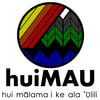
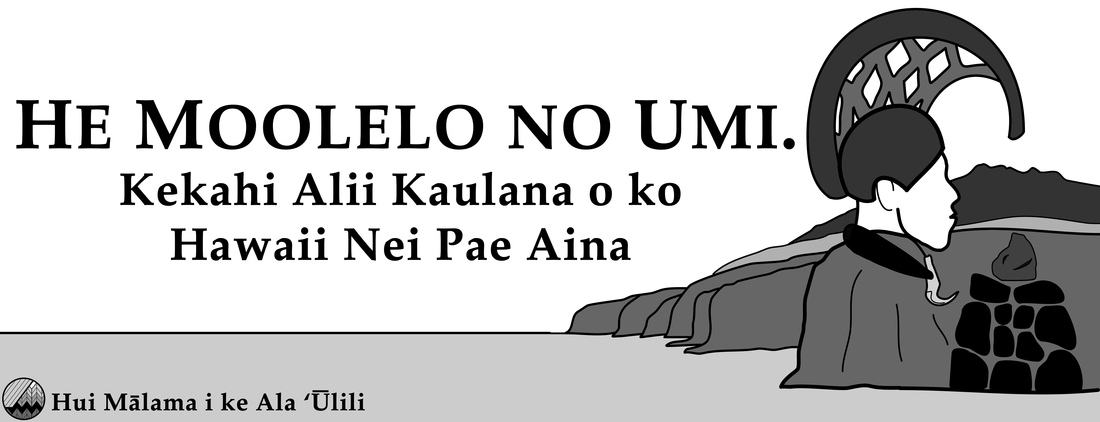
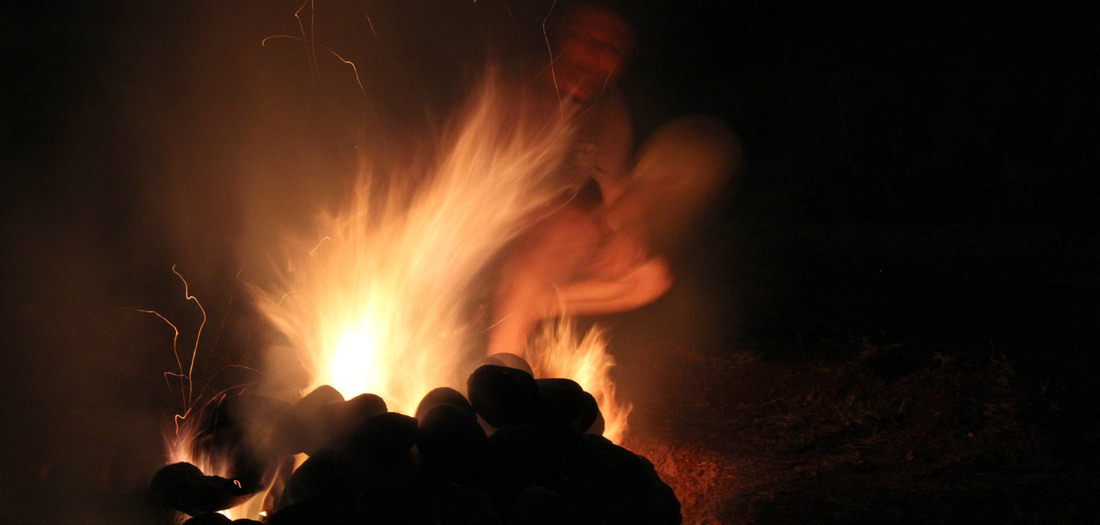
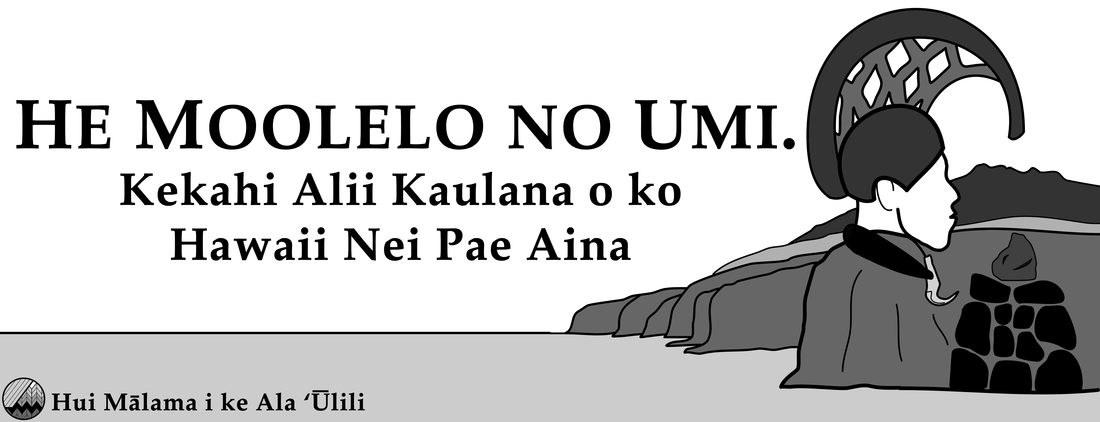
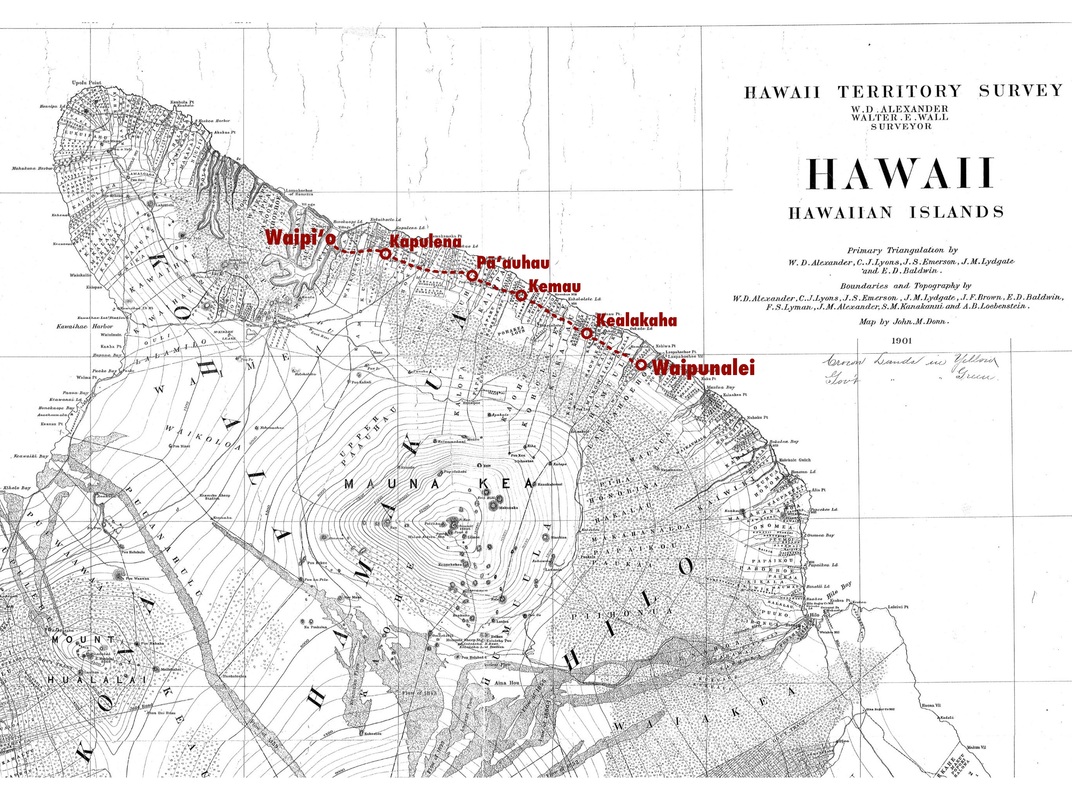
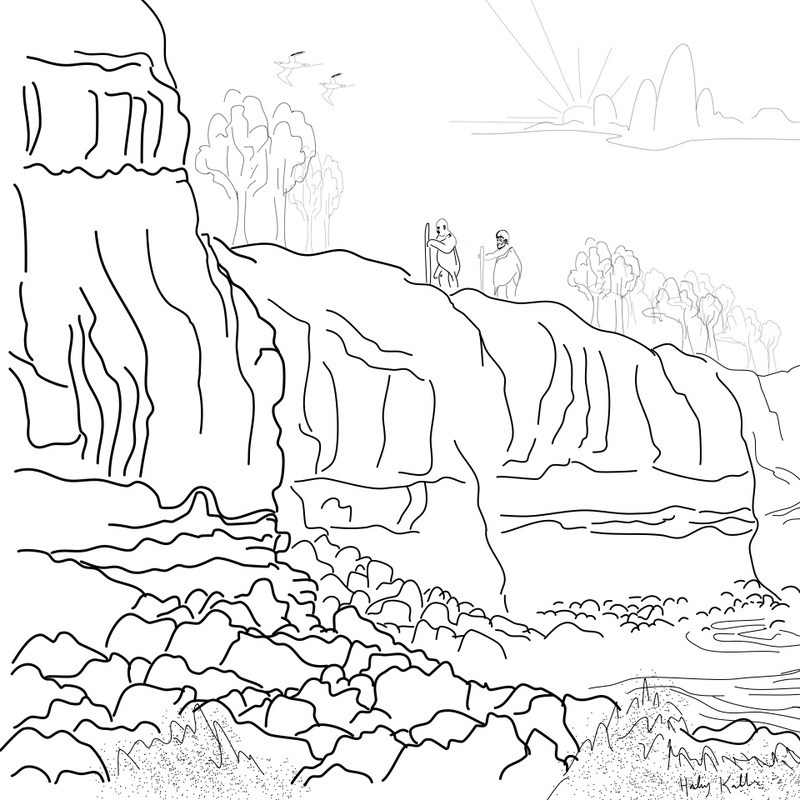
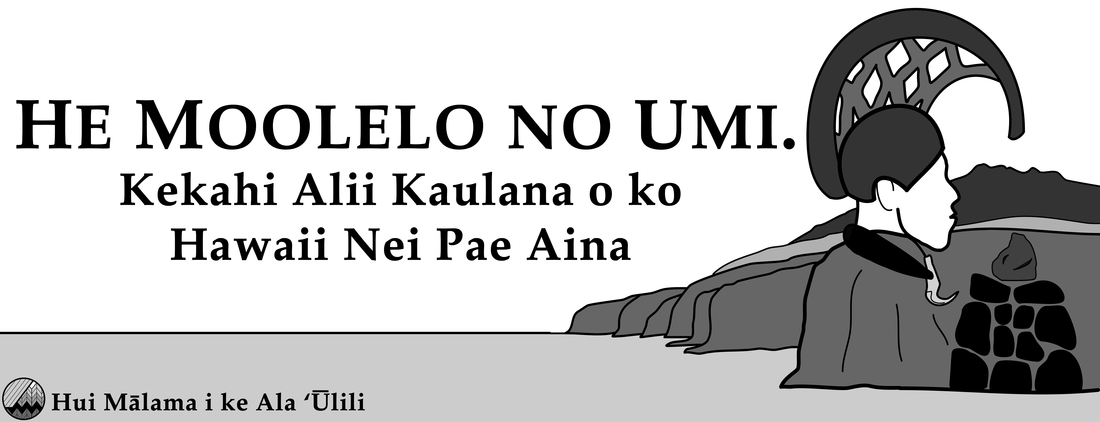
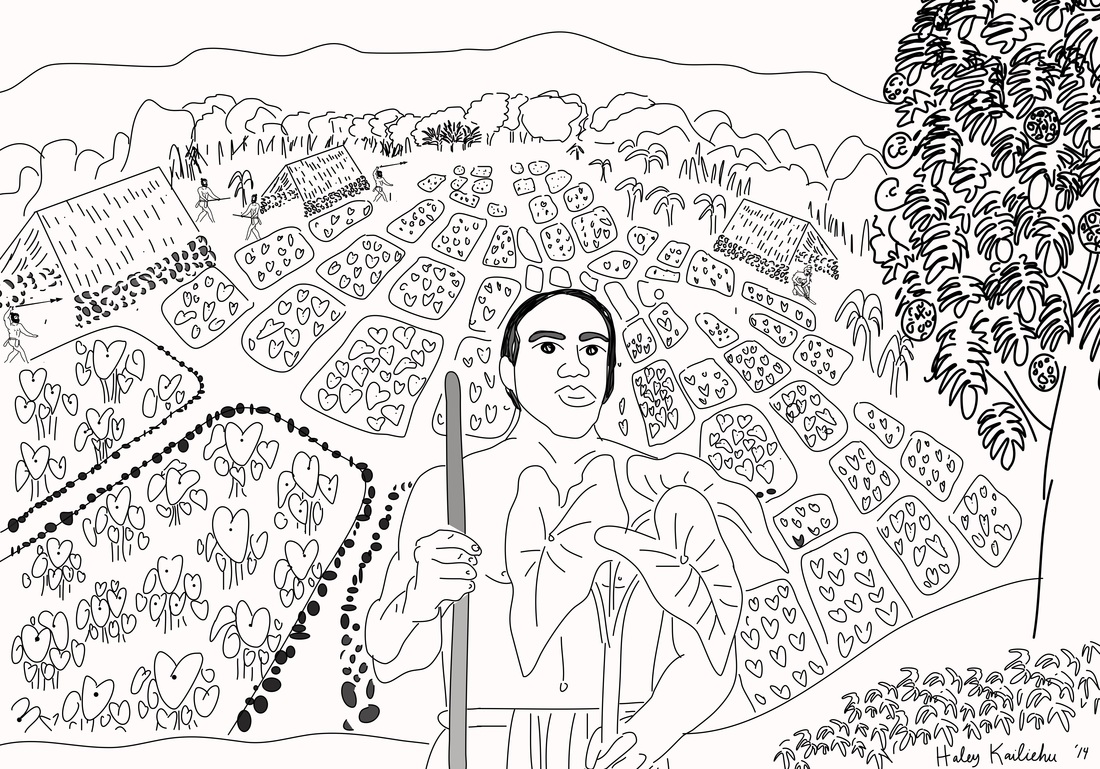
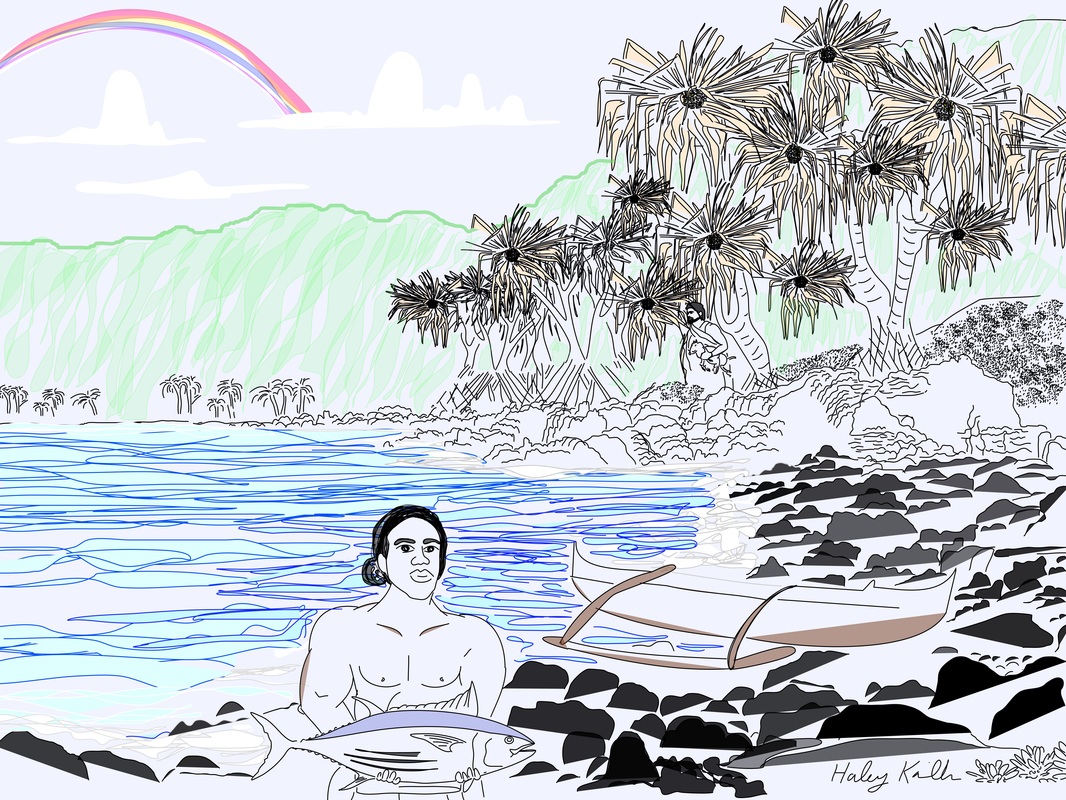
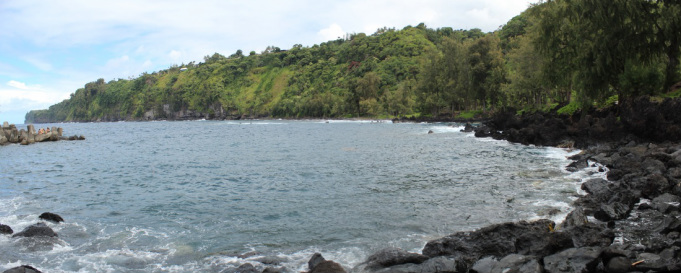
 RSS Feed
RSS Feed